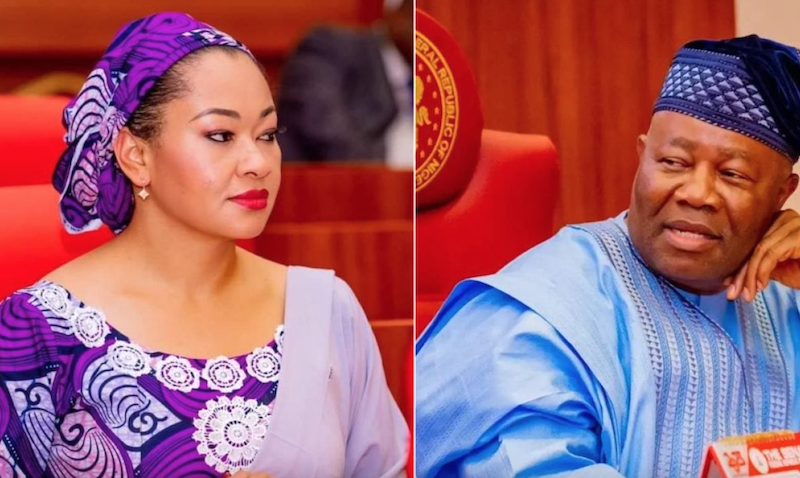On Thursday, March 06, 2025, the Nigerian Senate ignited a firestorm by suspending Senator Natasha Akpoti-Uduaghan (PDP, Kogi Central) for six months, a move legal experts have slammed as illegal, unconstitutional, and a grotesque violation of her rights. The decision, announced defiantly a day after a Federal High Court in Abuja barred the Senate’s Ethics Committee from probing her alleged misconduct, has plunged the legislature into a crisis of credibility. Justice Obiora Egwuatu’s order demanded the Senate justify its investigation within 72 hours, yet it barreled ahead with the suspension, thumbing its nose at the judiciary.
Senior Advocate of Nigeria (SAN) Kunle Edun didn’t mince words: “This suspension is an aberration by a Senate that ought to know better.” Citing Order 67(4) of the Senate Rules, which caps suspensions at 14 days—a rule he deems unconstitutional—Edun argued the six-month ban flouts legal limits. Worse, with the matter already sub judice, the Senate’s actions reek of “legislative rascality.” He stressed that separation of powers doesn’t excuse disobeying a court order; the Senate should have challenged it legally, not ignored it. “It’s lawless,” he fumed.
The controversy traces back to February 20, 2025, when Akpoti-Uduaghan clashed with Senate President Godswill Akpabio over her reassigned seat, sparking an Ethics Committee probe she refused to attend, citing the court’s injunction. Her suspension also follows her dogged pursuit of a sexual harassment petition against Akpabio—initially blocked, later accepted, but mired in procedural murkiness. Activist lawyer Deji Adeyanju called it “a blatant attempt to silence her,” decrying the lack of due process. “Neither Akpoti-Uduaghan nor Akpabio faced the committee,” he noted, likening it to Nigeria’s shady electoral antics—results declared without scrutiny.
Adeyanju also flagged a conflict of interest: the Ethics Committee chair had previously defended Akpabio, tainting the probe’s impartiality. “This isn’t just illegal—it’s an affront to democracy,” he said, echoing a growing chorus of outrage on X. Former Senator Shehu Sani chimed in, recalling his own near-suspension in 2018 for exposing senators’ allowances: “The Senate’s intolerance for dissent hasn’t changed.”
Akpoti-Uduaghan, unbowed, fired back: “This unjust suspension invalidates fairness and natural justice. It doesn’t strip my legitimacy—I’ll serve Kogi Central till 2027 and beyond.” Her defiance resonates with supporters who see her as a victim of a patriarchal, power-drunk Senate. Critics, though, argue she provoked the clash, pointing to her February outburst.
The fallout has X ablaze. “We’re not in a Banana Republic,” tweeted a former chief whip, cautioning the Senate. Others call it a dangerous precedent for legislative overreach, eroding trust in a body meant to uphold the law. As legal battles loom, Akpoti-Uduaghan’s suspension lays bare Nigeria’s democratic fault lines: a Senate flexing muscle over rights, a judiciary defied, and a senator fighting to be heard. This isn’t just her story—it’s a test of Nigeria’s rule of law.












I cant believe they suspended Senator Akpoti-Uduaghan! Is this really democracy in action or just a legal mess? #JusticeForAkpoti-Uduaghan
This suspension undermines democracy. Senators should be held accountable through fair processes, not arbitrary decisions. Justice must prevail.
I think the Nigerian Senates suspension of Senator Akpoti-Uduaghan is a clear abuse of power. Democracy should allow for dissenting voices.
I dont get why Senator Akpoti-Uduaghan was suspended. Seems like a power move rather than a fair decision. Thoughts?
I totally disagree with the Senates decision! Its a clear abuse of power and goes against democracy. Shameful!
I cant believe the Senate suspended them without due process! This is a clear abuse of power. #JusticeForAkpotiUduaghan
I believe the Nigerian Senate should be held accountable for their actions. Its a shame to see democracy undermined like this.
This suspension sets a dangerous precedent for silencing dissenting voices. Is this really the democracy we want? #FreedomOfSpeech
I think the Nigerian Senates suspension of Senator Akpoti-Uduaghan is a clear abuse of power. Democracy should allow for dissenting voices to be heard.
This suspension sets a dangerous precedent. Democracy should allow for dissenting voices, not silence them. #FreeSpeechMatters 🗣️🇳🇬
I cant believe the Senate suspended Senator Akpoti-Uduaghan! Is this democracy or a joke? Unbelievable. #NigerianPoliticsCraziness
I dont get why they suspended the Senator. Seems like a power move rather than a fair decision. Not cool.